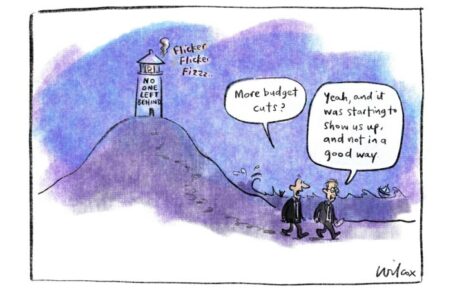Washington: Women’s reproductive rights will be severely curtailed in the US after the Supreme Court repealed a landmark law giving women the constitutional right to an abortion.
In a widely expected but highly contentious decision, the Supreme Court has adopted a draft opinion, leaked earlier this year, to overturn Roe v Wade – the 1973 ruling that for the past 50 years has ensured a federal right to abortion access.
Abortion rights demonstrators outside the US Supreme Court in May, 2022.Credit:Bloomberg
The decision essentially means the states will have authority over abortion policy in the US, with some states continuing to protect abortion rights, while almost half the states either ban or severely restrict abortion services.
“We end this opinion where we began,” said the ruling. “Abortion presents a profound moral question. The Constitution does not prohibit the citizens of each State from regulating or prohibiting abortion. Roe and Casey arrogated that authority. We now overrule those decisions and return that authority to the people and their elected representatives.”
While pro-life activists were thrilled by the decision – many screaming with joy outside the Supreme Court as the decision was handed down today – critics say the ruling represents the most damaging setback to the rights of women in the history of the country.
Pro-choice groups fear curtailing abortion access could lead to more unsafe procedures, result in unwanted pregnancies, or place pressure on the states that continue offer services as more people turn to them for treatment.
Thirteen states already have so-called “trigger bills” that will go into effect now that the Supreme Court has overturned Roe v Wade, making abortions illegal in their respective states.
Among the most restrictive states is Oklahoma, where the Republican government recently introduced new laws prohibiting nearly all abortions starting at fertilisation, accompanied by a bounty-hunting scheme encouraging members of the public to sue those involved in abortions and rewarding them with at least $US10,000 if their lawsuit is successful.
A separate law, which will take effect in August, would make performing an abortion a crime punishable by up to 10 years in prison, or a maximum fine of $US100,000 ($132,000), or both.
Friday’s (US time) ruling has set the scene for an explosive showdown between pro-choice and pro-life activists in the lead up to November’s midterm elections, and has paved the way for even deeper divisions across the country.
A crowd gathers outside the Supreme Court in Washington after the draft decision was published in May.Credit:AP
Tensions were already high in the lead up to the ruling, with steel fencing installed around the Supreme Court last month in anticipation of potential unrest and security beefed up to protect the nine justices of the court.
Shockwaves hit the court earlier this month, when a man was arrested near the Maryland of Justice Brett Kavanaugh, one of the conservative judges appointed by Donald Trump, over an alleged attempt to assassinate him.
Nicholas John Roske, 26, of Simi Valley, California, pleaded not guilty to on one count of attempting to assassinate a Supreme Court justice – a charge that carries a maximum sentence of life in prison.
More to come
Get a note directly from our foreign correspondents on what’s making headlines around the world. Sign up for the weekly What in the World newsletter here.
Most Viewed in World
From our partners
Source: Read Full Article



